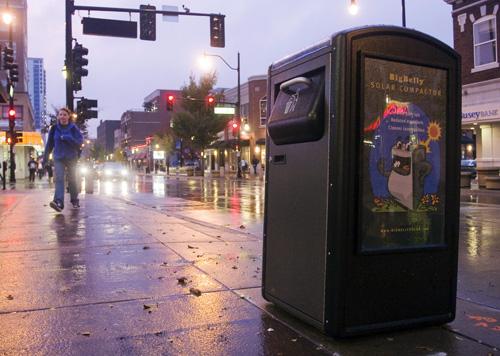BigBelly gobbles more, digests less

A pedestrian walks past a solar-powered garbage compactor on Green Street on Thursday afternoon. The cans will be used on a trial basis throughout campus. Erica Magda
Nov 7, 2008
Last updated on May 13, 2016 at 04:46 p.m.
The University’s garbage is going green.
The city of Champaign and the University have purchased eco-friendly BigBelly solar compactors to reduce the number of trash pickups.
BigBelly solar compactors are garage collectors that rely on solar panels for energy. They use the sun’s rays to compact waste, thereby increasing capacity by five times the normal rate. Champaign officials are hoping the equipment will ultimately save the city money.
“We’re looking for a way to test out new technology,” said Champaign city planner TJ Blakeman. “So far, we thankfully haven’t had any problems.”
Get The Daily Illini in your inbox!
The large green vessel collects 150 gallons of trash at a time, and a yellow light flashes when the can is full. When it is ready to compact, a BigBelly will exert 1,200 pounds of force. Each compactor contains a 12-volt battery charged 100 percent by its solar panels on top.
“We have the right to make our grounds as nice as we possibly can,” said Lenny Willis, director of athletic facilities. “It’s a green project. That’s our commitment to being green.”
The city-purchased BigBelly sits on Green Street between Sixth and Wright streets. The Champaign City Council approved the spending of $4,407 for the compactor, and it was installed Oct. 30, Blakeman said.
The University purchased four BigBellys, all located on athletic facilities. They are available at the Ubben Complex, on the east and west side of the Memorial Stadium and the Irwin Indoor Facility.
“So far they’ve been pretty successful,” Willis said. “We may get one for Assembly Hall. A lot of students are into being green and this product helps.”
Besides University grounds, BigBelly compactors also call Fenway Park, Chicago’s Millennium Park and The Alamo home.
The city first struck interest in BigBelly over the summer and decided to purchase one on a trial basis, Champaign management analyst Patti Anderson said.
According to Inform, an environment research group, nearly 91 percent of garbage trucks in the United States get about three miles per gallon running on diesel fuel. With BigBelly’s help, the city and University will pick up from these compact sites less frequently.
“We can put in more trash than normal trash cans, and we don’t have to empty it nearly as often,” Willis said.
If all goes well with the trial, Anderson suspects more to be on the way.
“We’re not really sure what the effects will be just yet,” Anderson said. “But it’s meant to help everyone. That’s what we’re hoping for.”





